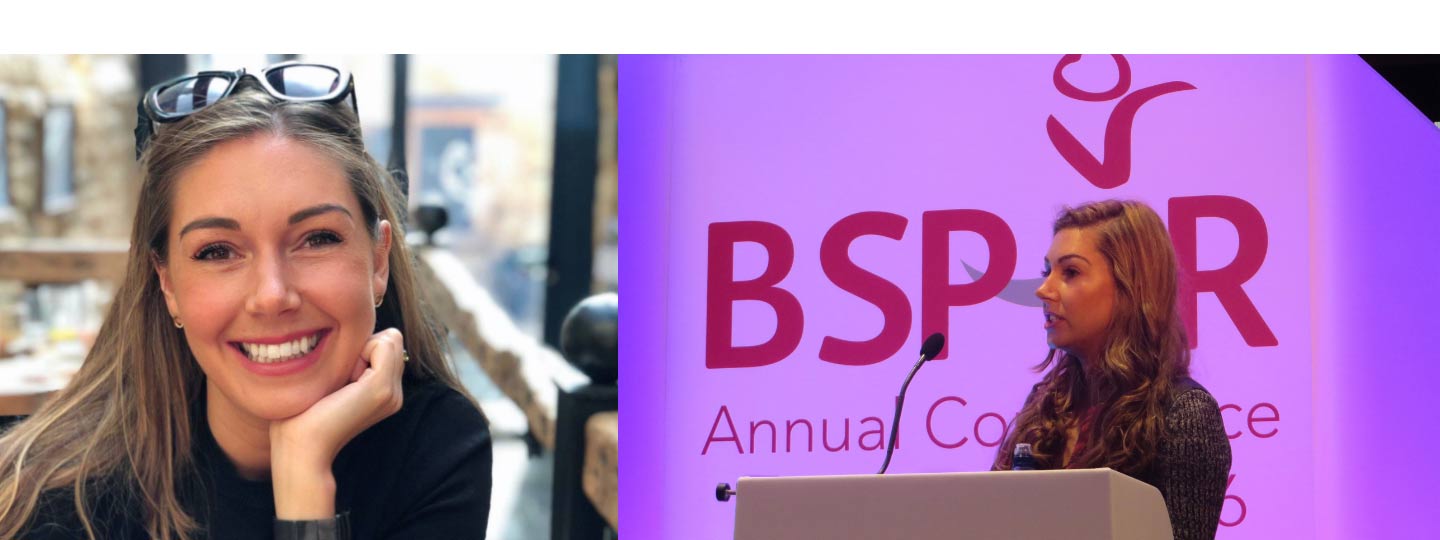How is our research helping young people to talk about their pain?
20 December 2021
More than half of the 10 million people with arthritis say they experience pain every single day, and eight out of ten say they experience it most days. This includes childhood pain, which is still very poorly understood.
Dr Rebecca Lee is a Versus Arthritis foundation fellow investigating the way young people and children experience pain. This includes how they communicate this with their doctor and how this could be improved. Here Rebecca shares why she’s passionate about her research:
How did you get into pain research?
My interest in pain research started during my undergraduate Psychology degree and continued into my Master’s degree in Health Psychology.
During my PhD within the Centre for Epidemiology Versus Arthritis, I realised that many of the ways in which we try to assess pain experiences do not take account of the developmental level of the child or young person, or how they may talk about pain. This sparked my interest to study new ways of communicating pain.
I worked closely with children and young people with juvenile idiopathic arthritis on the development of a digital pain self-assessment tool called ‘My Pain Tracker’.
My Pain Tracker can be used to record daily information about pain, including intensity, location, qualities, emotion and interference. This allows the patients, their parents, healthcare professionals and researchers to look at interesting patterns in pain over time rather than just one-off snapshots.
Why can talking about pain with your healthcare professional be difficult?
The experience of pain is highly individual and complex. We don’t always have the words for these experiences even as adults, and for children and young people it can be even trickier. Pain can be present in several different locations, all of which may feel different and have different intensities, qualities and consequences. The effects of pain in everyday life can change considerably over time.
Some people may have good or bad days or weeks or have pain that is worse in the morning and better in the evening. Keeping track of all of these differences AND being able to find the words to tell someone else about it can be very challenging.
Why can this be more challenging for children and their families?
Children and young peoples’ way of thinking, their perspectives, their understanding of timelines or consequences of pain may be very different to those of the adults around them, including their parents as well as healthcare professionals.
There are also interesting dynamics involved when parents are part of consultations. For example, children and young people may want to protect their parents from hearing about the impact of their pain. Parents may also have their own perceptions about pain and they can be a useful additional source of information for healthcare professionals.
What is the aim of your current research?
The aim of my current research is to find out how we can best support effective “Communication by Healthcare professionals Assessing and Managing Pain”; hence the acronym “CHAMP”. I am exploring how pain is being discussed amongst healthcare professionals and how this influences pain management decisions, particularly in paediatric rheumatology.
I am also investigating the conversations about pain which are had between children/young people, parents and healthcare professionals to find out what ‘good’ pain communication is as well as what ‘poor’ pain communication looks like. Ultimately, I am hoping to develop methods to make pain communication better by building upon those ‘good’ aspects of pain communication.
What has your research found so far?
I am currently collecting lots of new research data and so I will have much more to tell you next year.
So far, I’ve identified some important gaps in healthcare training that we can start to address now. The area of pain research is rapidly developing, and we need to find ways to update the pain knowledge and pain-management skills of current healthcare professionals working in paediatric rheumatology.
You can read my article about how ways we could potentially update pain knowledge in the future.
How do you hope your research will help treatments in the future?
The findings of this research will go a long way towards improving how healthcare professionals assess and communicate about pain with children and young people with persistent musculoskeletal pain.
I hope that the resources that I create will support healthcare professionals, parents and children/young people with pain, as well as improve both the short-term and long-term outcomes of these younger individuals.
You can keep updated on the progress of my research by on the CHAMP studies project website.
Our services
If you or a family member under the age of 25 has arthritis, we run a Young People and Families service that provides information and support and puts on a range of events across the country.
Our service helps young people and children offers advice on how to live well with arthritis, medication and potential treatments, as well as creating a safe space to ask questions, receive information and develop support networks.
Find out more about our Young People and Families service.
We’re here whenever you need us.
- If you would like to talk to someone, you can call our free helpline on 0800 5200 520
- Chat to our Arthritis Virtual Assistant
- Join our online community
- Stay in touch and follow us on Twitter, Facebook and Instagram.